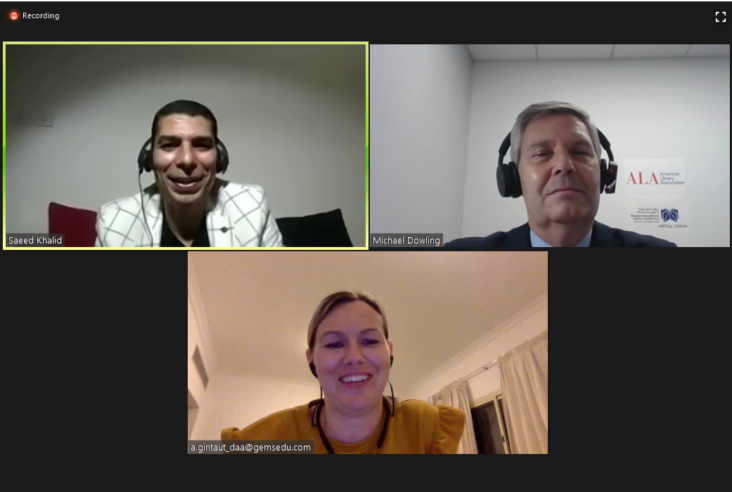SILC Outlines Strategies For Adapting To Post-Covid Realities, Highlights Best Practices

The seventh edition of the Sharjah International Library Conference (SILC) concluded on November 12 (Thursday) after three days of presentations and workshops, with participants pledging to create new services, develop and enhance skill sets and continue to connect and share during these unprecedented times.
Organised by the Sharjah Book Authority (SBA) in collaboration with the American Library Association (ALA) on the side lines of the ongoing 39th Sharjah International Book Fair, the three-day event saw the participation of 723 attendees including library professionals, technology and book industry experts and members of media from more than 51 countries around the world. The event was hosted virtually from the USA.
Librarians role in keeping students engaged
The first session of the concluding day themed ‘How to Keep Students Engaged’ was delivered by Amanda Gintaut, middle school teacher-librarian at the Dubai American Academy. She spoke about how the school library deployed the LibGuide, a content management system, for listing resources and informing students and teachers about their availability in the library.
“We started using the system last year and it has been very successful, but we realised its true potential when school was closed due to COVID-19,” she said. “The children were introduced to the LibGuide, which is connected to our cataloguesand also lists links to resources outside the library. It contains forms which students can fill up to request a book, and we either hold it for them to pick up later or deliver it to their class. Now, all students have LibGuides stored on their desktops, so everybody is truly connected to the library.”
Gintaut also created Screencast videos that demonstrate how students can search the catalogues, including links to fact checking databases. “It is important to maintain a good relationship with the teachers, so we curate resources for teachers, share a weekly update on what is available in the library, and the activities we are planning. We check in with teachers regularly to let them know how we can help with their work.”
“We also provided students and teachers with online books from external libraries during the lockdown period. The Sharjah Public Library proved to be a fantastic source with a huge database that they opened out to the public for three months. We also run virtual book clubs where students share books they would like to read, and this initiates a conversation among them as well as with librarians and teachers, which all helps in being connected and engaged,” she shared.
Aiding virtual learning
In the concluding session titled ‘Expanding School Librarians Role in Virtual Learning’, Saeed Khalid, Librarian, Ibn Khuldoon National School, Bahrain, spoke about how school librarians could play a bigger role in online education.
“With hybrid learning likely to be more or less permanent, librarians must ramp up digital resources, support and train both teachers’ and students, and implement various applications for virtual activities,” said Khalid.
The librarian’s role did not stop with providing resources, digital or otherwise. “We must also support students with virtual learning, while also assisting teachers in preparing for it. We have to support in formulating a viable format for this new way of learning,” he noted.
The librarian was the most important link between students, teachers, the curriculum, and the resources. “We have to activate the platforms we already have, search for the best ones available and increase subscriptions to resources,” said Khalid. “We have to aid both students and teachers in creating content relevant to their requirements. Initially, teachers were confused when teaching went online. We had to step in to help with accessing resources and platforms, and train with the tech team.”
The librarian’s role had increased in importance in the present situation, concluded Khalid. “They are now facilitators for teachers as well as students in using databases and curating lesson plans, giving inputs and motivating both sides. Our responsibility just doubled, but we are rising to the occasion.”
This year’s conference saw six sessions led by experts from around the world. Themed ‘Libraries and Librarians Meeting the Challenges in the New Normal’, the 7th SILC saw increased participation this year with delegates from 11 new countries joining in the dialogue on the strategic shifts required in the sector to navigate the unprecedented situation brought about by the Coronavirus pandemic.
Continuing SILC’s tradition of leading result-oriented discussions to boost the library sector ecosystem and develop and enhance the skillsets of industry professionals, the concluding sessions focused on how libraries and librarians were supporting their communities struggling to manage and move forward in the time of COVID-19 and beyond.

